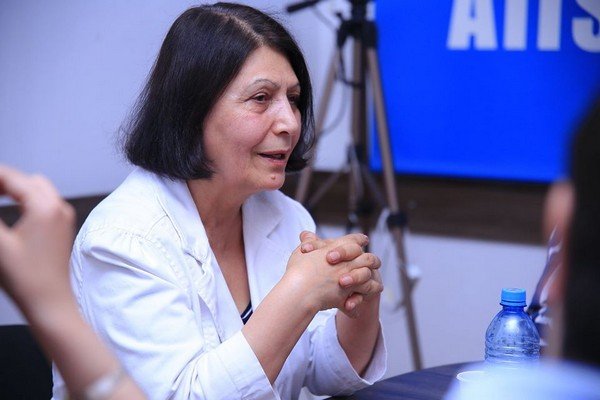According to Iranologist and expert from the Armenian Institute of International and Security Affairs (AIISA), Emma Begijanyan, it is in Iran’s best interests for Armenia to be a strong and independent country, but with the true Armenian borders, not with the borders that Azerbaijan wants Armenia to have.
In an interview with Aravot Daily, she explained, “Today, we are able to see that the main issue in Baku is that the Iranian presence in the so-called ‘liberated territories’ is very active and visible in the reconstruction phase. Especially after the Islamabad declaration where Azerbaijan announced that it had already invited Pakistani and Turkish companies, and after the visit of Iranian Minister of Foreign Affairs Mohammad Javad Zarif, Azerbaijan agreed to Iran’s active presence.”
When asked about what is stopping Armenia from developing deeper relations with Iran right now, Emma Begijanyan responded, “Nothing is. It’s just that Armenia will provide a corridor, let’s say, which is Iran’s weak side since Iran was also shocked by that. Iran was very shocked that this issue could have been a point in the agreement. That received a huge response from Iran’s economic and political circles.”
Regarding Armenia’s foreign policy towards Iran, the Iranologist said, “Our policy towards Iran has always been weak.” She remembered the 1990s and continued, “Armenia never had serious policies or diplomacy towards Iran. Let me give one clear example. In 1997 during the Organization of Islamic Cooperation summit, 57 leaders of Muslim nations were present. The only thing I was told by the embassy at the time since Levon Ter-Petrossian was considered an illegitimate president by then was to ask when Levon Ter-Petrossian would be invited to Iran when I had the chance. But at the time, the Lisbon negotiations were discussed during that summit, and a decision was reached. Until then, it was possible to meet with the delegations via the embassies. In other words, there was no other form of policy or diplomacy here. It was very weak.”
Read also
When reminded that the Deputy Chairman of the Security Council of Russia, Dmitry Medvedev, said that the Artsakh conflict resolution also must be discussed with Turkey due to the events in the region, and when asked how she would comment on this statement from the perspective of relations with Iran, she said, “The fact is that this is how it is. Turkey has an important role. When we see that it wasn’t Azerbaijan who planned and executed the war, but Turkey, it must have a role to play, naturally. Once, I said that during the first war in 1993, when the Armenian forces were moving forward, the Iranian president was in Azerbaijan on October 27th. Aliyev’s father offered that he come and carry out an Islamic revolution in Iran to save them because the Armenians would reach Baku otherwise. In other words, he wanted Iran to help them in any way. The Iranians, after considering many factors, rejected him. Aliyev did the same thing with his brother, Turkey. Erdogan loved that. Therefore, Turkey is the one who decides everything. The tool is already Turkey and not Azerbaijan. That is why we must consider Turkey’s opinion. If the Minsk Group co-chairs do nothing, we can assume that the Russians and Turks will decide how the issue will be resolved.”
In this context, Emma Begijanyan believes that the main purpose of the Iranian Minister of Foreign Affairs’ visit to the region was to maintain that the Artsakh conflict reaches a resolution so that stability and long-lasting peace can be achieved in the region. Regarding this, she said, “In general, Iran supported territorial integrity. The minister announced in Armenia that it is important to consider the rights of ethnic minorities, including the right to self-determination, but within the framework of territorial integrity. In extreme cases, they can suggest self-government as before, but that means nothing for Armenians besides ethnic cleansing. That is why Iran’s role should not be prioritized here. Especially since its relations with Turkey are not very bad.”
According to Emma Begijanyan, the only issue for Iran, which was probably discussed in negotiations with Iran during this period, is that no corridor will be provided to Azerbaijan via Syunik. Iran’s interests demand it. It is in Iran’s best interests for Armenia to be an independent and strong country, but with the true Armenian borders, not the borders Azerbaijan wants it to have.
Tatev Harutyunyan
“Aravot” daily






















































